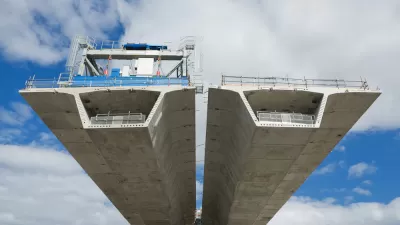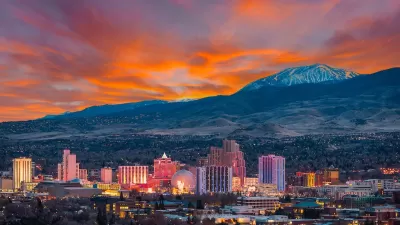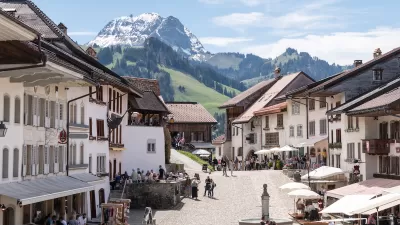Two economists discuss how specific kinds of deregulation could speed up growth. They emphasize planning issues: local overregulation of development and the high cost of infrastructure, among others.

In this piece, the follow-up to a debate on how government can promote growth, economists Tyler Cowen and Noah Smith debate how the American economy can be made more efficient and productive. They advocate for looser regulations and labor laws, but they also touch on land use policy and infrastructure.
Says Smith, "I think the two biggest and most obvious things to address are land-use regulation and occupational licensing. There's an increasing recognition that policies to prevent dense development are holding cities back from their economic potential."
Smith also favors infrastructure investment. "Repairing our existing infrastructure gets the highest returns, of course. But increased investments in new things like self-driving car infrastructure, smart electrical grids and faster broadband seem like they could also pay dividends."
Cowen pushes even harder for deregulation. "We couldn't have built today's energy infrastructure with today's regulations, so how are we to manage the energy infrastructure of the future? Less NIMBYism for wind power is step one of a thousand we could make. Or take fracking. It has made energy cheaper, created jobs and helped lower carbon emissions. And yet it remains a legally fraught enterprise."
Smith agrees that we have made it very difficult to build new infrastructure, but doesn't assign blame to labor laws, as Cowen does. "Regarding infrastructure costs, I doubt that unionized labor is a big part of our problem, since Europe has stronger unions but much cheaper costs. It's probably due more to our inefficient contracting process."
FULL STORY: Debating the Supply Side of Growth

Maui's Vacation Rental Debate Turns Ugly
Verbal attacks, misinformation campaigns and fistfights plague a high-stakes debate to convert thousands of vacation rentals into long-term housing.

Planetizen Federal Action Tracker
A weekly monitor of how Trump’s orders and actions are impacting planners and planning in America.

San Francisco Suspends Traffic Calming Amidst Record Deaths
Citing “a challenging fiscal landscape,” the city will cease the program on the heels of 42 traffic deaths, including 24 pedestrians.

Defunct Pittsburgh Power Plant to Become Residential Tower
A decommissioned steam heat plant will be redeveloped into almost 100 affordable housing units.

Trump Prompts Restructuring of Transportation Research Board in “Unprecedented Overreach”
The TRB has eliminated more than half of its committees including those focused on climate, equity, and cities.

Amtrak Rolls Out New Orleans to Alabama “Mardi Gras” Train
The new service will operate morning and evening departures between Mobile and New Orleans.
Urban Design for Planners 1: Software Tools
This six-course series explores essential urban design concepts using open source software and equips planners with the tools they need to participate fully in the urban design process.
Planning for Universal Design
Learn the tools for implementing Universal Design in planning regulations.
Heyer Gruel & Associates PA
JM Goldson LLC
Custer County Colorado
City of Camden Redevelopment Agency
City of Astoria
Transportation Research & Education Center (TREC) at Portland State University
Jefferson Parish Government
Camden Redevelopment Agency
City of Claremont





























